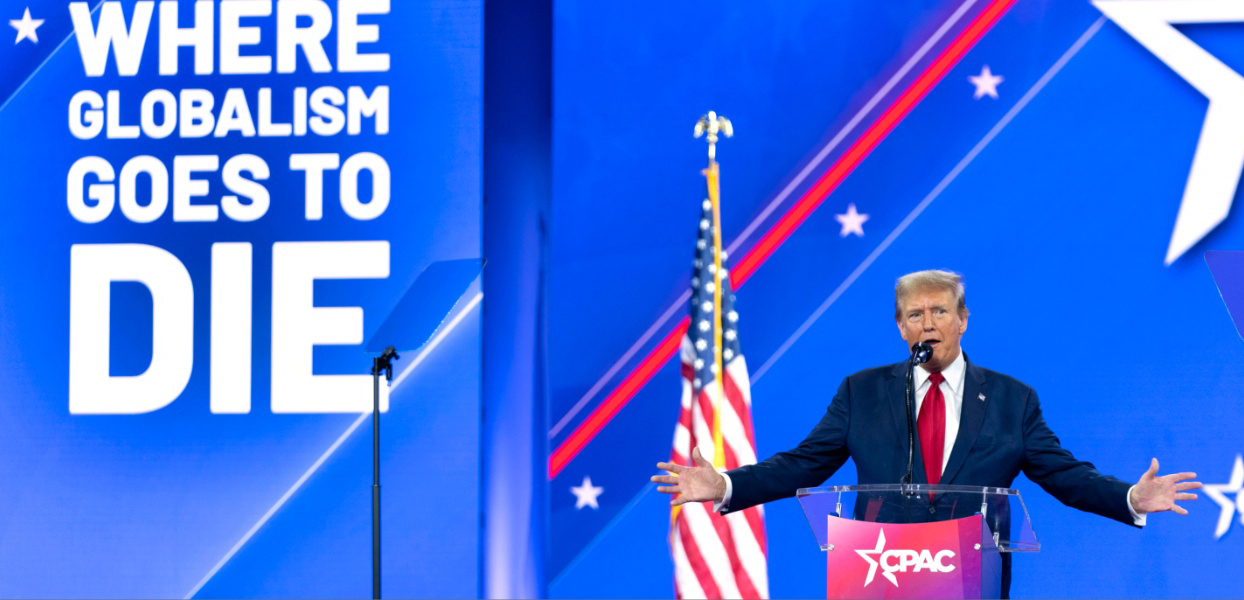The U.S. president’s policies have fueled deglobalization and disrupted the existing international order, but they have also pushed countries around the world to explore new models of cooperation and foster new approaches to trade.

Trump has long pitched his economic policies as a fight against 'radical left globalism,' but the globalizers he's mainly fighting are within the capitalist class itself - not the left. Here, Trump addresses the Conservative Political Action Conference on Feb. 24, 2024. (Photo: Jose Luis Magana / AP)
Since World War II, globalization has developed rapidly and profoundly reshaped the world. The United States has long played an important role in this process by promoting global trade liberalization, facilitating international capital flows and championing the principle of global rules. However, shifts in its political ecosystem in recent years — especially during the Donald Trump era, with his “America first” policy — have made a significant impact on the trajectory of global trade.
First, Trump’s tariff policies have caused chaos. He has arbitrarily imposed tariffs on many countries, which triggered retaliatory tariffs as those countries seek to protect their own industries and trade interests. This, in turn, leads to a vicious cycle. Trump’s trade protectionism has increased production costs for businesses, harmed consumer welfare and seriously affected global economic growth. Moreover, U.S. efforts to promote the reshoring of manufacturing has pushed some companies to withdraw their overseas production activities, disrupting global industrial chains and undermining the international division of labor. These changes are eroding the cornerstone of global development.
Second, Trump has disrupted the environment for cooperation. In addition, ongoing competition between major countries has fueled risk awareness, deepened mutual distrust and fundamentally undermined the political basis for international cooperation on global issues. At the same time, Trump has rolled out a series of restrictive measures, such as strengthening border controls, curbing immigration and limiting access for international students. These have hindered the global flow of labor and affected international people-to-people exchanges and cooperation.
In addition, the U.S. withdrawal from UNESCO and the Paris agreement has weakened the authority of international organizations such as the United Nations, and the multilateral agreements,. It has undermined the principles and mechanisms of international cooperation, reduced the efficiency of global governance and introduced more uncertainties and risks into the process of globalization.
It should be noted, however, that neither Trump’s presidency nor the anti-globalization trend it has encouraged has fundamentally changed the reality of global interconnection and mutual integration. Although major indicators of globalization — international trade, cross-border investment and people-to-people exchanges — have experienced fluctuations, they have not collapsed. This suggests that while Trump may have amplified the extreme voices critical of globalization, he will not be able, at least in the foreseeable future, to reverse the decades-long process of globalization. It’s true that his policies have emerged amid a broader wave of populism in Europe and the United States, indicating a declining enthusiasm for globalization in the West.
But this doesn’t mean that globalization has reached the point of no return. Interest groups represented by emerging technology companies, such as Nvidia, are imposing new constraints on Trump’s anti-globalization agenda. His erratic approach to general tariffs and trade negotiations with China illustrates not only the reality of global interdependence but also the direct pressure that transnational capital exerts on the U.S. administration.
Trump’s policies have fueled deglobalization and disrupted the existing international order, but they have also pushed countries around the world to explore new models of cooperation and to foster a new forms of trade. Faced with challenges posed by the Trump administration, much of the world has strengthened regional cooperation. In the Asia-Pacific, the signing of the Regional Comprehensive Economic Partnership — one of largest and most important free trade agreements ever to come along — is expected to promote regional trade liberalization and investment facilitation and strengthen cooperation on regional industrial and supply chains.
Meanwhile, the EU has worked to strengthen internal integration, thus fortifying its single market and enhancing its competitiveness in the global economy. The UK, though no longer a member of the EU, is pursuing closer cooperation with countries on the continent. In Africa, the African Continental Free Trade Area is helping to promote trade and economic integration across the continent. Such regional initiatives offset the impact of deglobalization and are emerging as new drivers of global economic cooperation.
In creating new forms of globalization, emerging economies are taking on an increasingly prominent role. Countries such as by China and Brazil have seen rapid growth, with their share of the global economy continuing to rise. For example, China launched the Belt and Road Initiative, which aims to promote economic development and connectivity in partner countries by strengthening cooperation in infrastructure construction, trade, investment and people-to-people exchanges. The BRI has provided new momentum and platforms for global development.
Moreover, emerging economies have participated in the formulation of international rules, participated in the reform of the World Trade Organization and international financial system and brought greater fairness and equity to the international economic order.
As the United Nations approaches its 80th anniversary, the upcoming Summit of the Future represents a strong desire in the international community to build a new global cooperation mechanism to reshape the global environment for cooperation.
Apparently, while Trump’s anti-globalization policies, which are based on domestic political considerations, have disrupted global cooperation, they also clearly highlight the gradual decline of America’s global influence and have revealed growing conflicts of interest with other countries. While the United States has been the main driving force for globalization historically, its dominance may diminish in the future. Instead, a more inclusive and win-win form of globalization is likely to emerge, shaped by the collective efforts of countries around the world.
